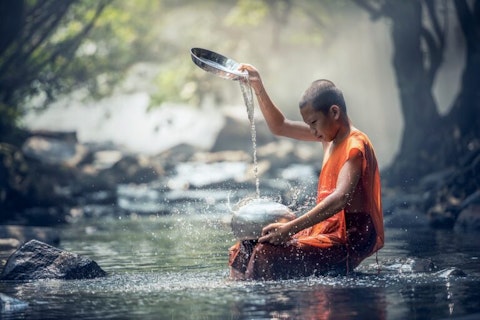Asking people on the internet about the worst countries to live in Asia will yield various answers and opinions. Everyone has their own reasons for liking or disliking a place. Some countries in Asia are economically developed but have high living costs, while others are uncomfortable or dangerous to live in.
One significant issue in certain Asian countries is conflicts and wars that never seem to end or only have short peaceful periods. Countries with recent war activities are generally considered some of the worst to live in. However, that’s not the only criterion. According to Rappler, crime rates in certain countries also play a crucial role in determining how dangerous they are for residents. If you’re planning to live in a country in Southeast Asia, it’s essential to consider which one is the most dangerous country in Southeast Asia.

Pixabay/Public domain
But even if we disregard war activities and choose a country without any current or foreseeable wars, our research doesn’t end there. Some countries have extremely high living costs, making it challenging for people like digital nomads and freelancers to find an affordable place to live a normal life. It’s important to distinguish between poor and cheap countries, as top 20 poorest countries in Asia could have a low quality of life, lack essential services and luxury, and may have limited access to medical help and education.
Living in a country as an ex-pat or a citizen presents unique challenges. Citizens may have more rights and better job and education opportunities, while ex-pats might face violations of human rights, stereotypes, or even violence. It’s also worth noting that countries known for tourism might have significantly higher living costs, making them less desirable for ex-pats.
To compile the list of worst countries to live in Asia, we considered several parameters. We considered the crime rate in each country, as it’s a crucial factor when assessing safety. The cost of living was another important consideration, especially for those looking to work and live in these countries. We also compared the rankings with the human rights and law standings of each country, and we used the Global Peace Index in our research. By calculating an average place on the list based on all four parameters, we determined the final rankings. Although we might not have all the parameters for some countries, we still placed them at the top of the list, considering their other qualities and importance. Some countries on the list may surprise you, but honestly, we expected some of them to rank high.

Pixabay/Public domain
20. Georgia
Georgia is undeniably a beautiful country, offering top-notch entertainment, sports, and diverse cuisine. However, before considering a move there, it’s essential to acknowledge the issues that need resolution. On the positive side, Georgia boasts below-average housing costs, low taxes, and a relatively affordable cost of living compared to many other U.S. cities. Nonetheless, its high Global Peace Index (GPI) ranking places it on our list of consideration.
19. Singapore
The allure of Singapore, nestled in its jungle-framed cityscape, is undeniable. With towering skyscrapers and consistently warm temperatures above 77°F, it welcomes everyone, be it solo expats or families. Just remember, living in Singapore comes at a steep price.
18. Japan
Regarding the high prices and costs, Japan is known for having a relatively high cost of living in certain areas, especially in cities like Tokyo and Osaka. Accommodation, transportation, and some consumer goods can be expensive. However, there are also ways to live more affordably by exploring different regions and adopting a more frugal lifestyle. As for the challenges faced by ex-pats, particularly women, in Japan, it’s true that cultural differences can play a significant role in adapting to life in a foreign country. Japan has a unique culture with specific social norms and expectations, which might be different from what some ex-pats are accustomed to.
17. Vietnam
Vietnam’s appealing climate, affordable living costs, vibrant culture, and ongoing infrastructure developments have drawn the interest of expats. However, despite these advantages, there are certain recurring issues that expats often complain about while living in Vietnam as digital nomads. Chief among them is the problem of pollution, leading to the widespread use of masks by both locals and foreigners to safeguard against inhaling harmful fumes. Additionally, the traffic conditions in Vietnam pose a significant challenge, with streets frequently congested due to the sheer number of cars and motorbikes, contributing to one of the highest road fatality rates globally.
16. South Korea
South Korea is often associated with a unique blend of bustling city life and serene countryside, making it an attractive destination for many foreigners. South Korea has experienced significant economic growth over the years, which has resulted in improved living standards and a reasonable cost of living in comparison to some other developed countries. However, it’s important to clarify that crime rates and safety can vary within different regions of any country, including South Korea.

Pixabay/Public domain
15. Azerbaijan
It’s great to hear that the city center of Baku, Azerbaijan, is generally considered safe for a single woman, especially during the summer when there are many families and pedestrians around. However, it’s essential to exercise caution and be always aware of your surroundings, regardless of the time of year or location. Regarding the conflict zones of Nagorno-Karabakh, Nakhchivan, and Dagestan, it is essential to heed the travel advisories issued by your government or relevant authorities. These areas may have ongoing security issues and political tensions, making them unsafe for travelers.
14. Kazakhstan
Kazakhstan is generally considered a safe place for expatriates to live, but like in any country, there are certain safety considerations and precautions that should be considered. Tensions between different socio-economic groups can lead to incidents like muggings and theft, especially in urban areas. Expats are advised to be cautious and take necessary measures to enhance their personal safety. The open-air market in Almaty, specifically, has been known for pickpocketing incidents. Being vigilant and keeping your belongings secure and close to you can minimize the chances of falling victim to such thefts. Regarding driving in Kazakhstan, it’s true that the traffic can be somewhat chaotic, especially in larger cities. Pedestrians should exercise caution when crossing roads and not assume that vehicles will stop for them.
13. Philippines
Living in the Philippines indeed offers many advantages, including a reasonable cost of living, delicious local cuisine, and beautiful beaches that attract expatriates from around the world. However, it’s crucial to address the issue of safety in the Philippines. While it’s not accurate to label the entire country as “not quite safe,” it’s true that there are certain safety concerns, especially in certain areas and cities. The Philippines has faced challenges related to crime, including petty theft, scams, and occasional violent incidents.
12. Kuwait
Kuwait is generally considered a safe country for expats. However, it’s important to use common-sense precautions, such as avoiding poorly lit areas at night, securing your belongings, and staying updated on local security information. The cost of living in Kuwait can vary based on your location and lifestyle. Housing, transportation, and utilities may be more expensive compared to some other countries. However, food, fuel, and certain consumer goods can be relatively affordable. As an expat, you can expect to live comfortably on a moderate budget.
11. Cambodia
One reason expats and tourists frequently express their fondness for Cambodia is the warm and welcoming attitude of the local population towards foreigners. They are often greeted with friendly “Khmer smiles” and treated as special guests wherever they travel. However, it’s important to note that Cambodia ranks high on the list of unsafe countries for living.
10. Israel
Israel’s high ranking in terms of expense can be attributed to several factors. The cost of living in Israel, particularly in major cities like Tel Aviv and Jerusalem, can be significantly higher compared to many other countries. Expenses related to housing, food, transportation, and entertainment can be quite costly. Israel also faces security challenges due to its geopolitical location and ongoing conflicts in the region. The country has a history of dealing with terrorism and security concerns, which can create an atmosphere of constant vigilance and uncertainty for residents and visitors alike.

Pixabay/Public domain
9. Sri Lanka
Life for expats and digital nomads in Sri Lanka is generally delightful. The country is renowned for its friendly locals, breathtaking landscapes, and mouthwatering cuisine. Expats and digital nomads have access to a diverse range of accommodation choices, from beautiful beachfront villas to cozy city apartments. Moreover, the cost of living is relatively low, making it attractive for those seeking affordability. However, it’s essential to acknowledge that there have been safety concerns surrounding Sri Lanka. It has ranked on lists of the most dangerous countries, which may give some potential residents or visitors pause for consideration. It’s crucial to stay informed about local security updates and exercise caution when traveling or living in the country.
8. Qatar
Adding to the burden of a high cost of living and renting, Qatar also has an unpleasant climate and a reputation for extremely dangerous drivers. Due to its unfavorable climate, Qatar offers limited opportunities for outdoor activities, leaving residents tied to closed spaces and offices for much of the time. Although not on the top of the list of the worst countries to live in Asia, it is on high position.
7. United Arab Emirates
The UAE provides modern accommodation and excellent medical facilities, along with reputable international schools and a well-developed infrastructure. The vibrant cities of Dubai and Abu Dhabi offer a plethora of entertainment options, such as beautiful beaches, water sports, indoor skiing, top-notch restaurants, and expansive shopping malls. However, it’s important to note that this luxurious lifestyle comes with a cost. The cost of living in the UAE has risen in recent years, and though expat salaries remain relatively high, benefits packages may not be as comprehensive as they once were.
6. Saudi Arabia
Expats in Saudi Arabia enjoy a high standard of living, thanks to substantial disposable incomes that allow them to indulge in luxuries. However, life in the kingdom may be perceived as restrictive, particularly for many expat women. The insular nature of housing compounds can also be off-putting for some individuals. As a conservative Islamic country, Saudi Arabia enforces strict regulations on various customs and practices, which can be quite different from what expats are accustomed to back home. While living in an expat compound can help mitigate culture shock, it’s essential to be mindful of local customs and adhere to the country’s regulations. Islam plays a significant role in governing all aspects of life in Saudi Arabia, including politics, business, family life, sexuality, and hygiene. While you are allowed to practice any religion within the privacy of your home, proselytizing is strictly forbidden, and breaking the law can result in severe punishments. It’s crucial for expats to be aware of and respect the cultural norms and laws of the country to ensure a positive and fulfilling experience while living in Saudi Arabia.
5. Iraq
The security situation in Iraq remains challenging, and expats planning to live there should be mindful of this fact. However, in more unstable areas of the country, workers are offered significant protection. Secure accommodations and private security teams are provided to accompany expatriates during their activities. The Kurdistan region is relatively stable and safe now, although those traveling to other parts of the country should take extra precautions. It’s important to be aware that certain border crossings, like those with Syria, may be closed suddenly due to concerns of being overtaken by ISIL. It is advisable to check the status of border crossings before making any travel arrangements. Staying informed about the security situation and heeding official advisories is essential for ensuring the safety of expats in Iraq.
4. Iran
The Iranian government does not publicly disclose crime rate statistics, and both international and local news only report a fraction of crimes committed. Due to this, it’s crucial to take necessary safety and security precautions while in Iran. A thriving black market for stolen foreign passports exists, so it’s advisable to always carry yours, preferably secured to your body. Be cautious in crowded bazaars, as they are known hunting grounds for pickpockets and street crimes. Certain areas like Sistan-Baluchistan, Bam, and the eastern regions of Bam and Jask are notorious for banditry and drug-trafficking, making it wise to avoid them. The roads in Iran pose a significant safety risk. The country has one of the highest per capita numbers of road deaths globally, as locals often disregard traffic rules. Therefore, exercise extra caution while traveling on roads.

Pixabay/Public domain
3. North Korea
Moving to North Korea can present significant challenges beyond just the cost of living. North Korea’s nuclear weapons development program and highly repressive regime create an uncertain security situation, making it unsafe for travelers to visit the country. Given the uncertain security situation, highly repressive regime, and lack of access to reliable information, there are numerous other crucial factors to consider. Issues related to safety, limited freedoms, cultural differences, and communication barriers are likely to be more pressing concerns for anyone contemplating a move to there.

Pixabay/Public domain